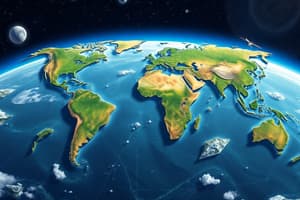Podcast
Questions and Answers
What is one of the fundamental geographic questions related to change over time?
What is one of the fundamental geographic questions related to change over time?
- Where are things located?
- Why are things located where they are?
- How do people interact with their environment?
- How do things change over time? (correct)
Which aspect of geography helps in analyzing patterns of population distribution?
Which aspect of geography helps in analyzing patterns of population distribution?
- Addressing global challenges
- Understanding spatial patterns (correct)
- Fostering global understanding
- Improving decision-making
How does geography assist in tackling environmental issues?
How does geography assist in tackling environmental issues?
- Improving cultural understanding
- By enhancing critical thinking skills
- Through urban planning techniques
- By addressing global challenges (correct)
What is a benefit of geography in urban planning?
What is a benefit of geography in urban planning?
What can geography promote in relation to analyzing geographic issues?
What can geography promote in relation to analyzing geographic issues?
How does geography contribute to global understanding?
How does geography contribute to global understanding?
Which fundamental geographic question addresses the relationships between different places?
Which fundamental geographic question addresses the relationships between different places?
Which branch of geography focuses on natural phenomena like climate and vegetation?
Which branch of geography focuses on natural phenomena like climate and vegetation?
What does spatial distribution refer to in geography?
What does spatial distribution refer to in geography?
Which geographic tool is primarily used for collecting and analyzing geographic data?
Which geographic tool is primarily used for collecting and analyzing geographic data?
What does the term 'biosphere' refer to in the context of Earth's systems?
What does the term 'biosphere' refer to in the context of Earth's systems?
The theory that explains the movement of Earth's lithosphere is known as what?
The theory that explains the movement of Earth's lithosphere is known as what?
Which branch of geography explores the relationship between humans and the environment?
Which branch of geography explores the relationship between humans and the environment?
What aspect of geography does the term 'region' encompass?
What aspect of geography does the term 'region' encompass?
Which process involves the breakdown and transportation of rocks?
Which process involves the breakdown and transportation of rocks?
Flashcards
Physical Geography
Physical Geography
The study of natural features like landforms, climate, vegetation, and water resources.
Human Geography
Human Geography
The study of human activities and their impact on the Earth, including population, culture, and economics.
Spatial Distribution
Spatial Distribution
The arrangement of features across space, considering their density, concentration, and pattern.
Place
Place
Signup and view all the flashcards
Movement
Movement
Signup and view all the flashcards
Human-Environment Interaction
Human-Environment Interaction
Signup and view all the flashcards
Lithosphere
Lithosphere
Signup and view all the flashcards
Atmosphere
Atmosphere
Signup and view all the flashcards
Geography
Geography
Signup and view all the flashcards
Spatial Patterns
Spatial Patterns
Signup and view all the flashcards
Change Over Time
Change Over Time
Signup and view all the flashcards
Relationships Between Places
Relationships Between Places
Signup and view all the flashcards
Improving Decision-Making
Improving Decision-Making
Signup and view all the flashcards
Fostering Global Understanding
Fostering Global Understanding
Signup and view all the flashcards
Study Notes
Branches of Geography
- Physical geography: Examines natural phenomena like landforms, climate, vegetation, and water resources.
- Human geography: Studies human activities, including population distribution, urbanization, economic activities, cultural landscapes, and political systems.
- Regional geography: Focuses on the unique characteristics of specific regions, combining elements of both physical and human geography.
- Environmental geography: Explores the relationship between humans and the environment, including issues such as pollution, climate change, and resource management.
- Cartography: The art and science of making maps.
Geographic Concepts
- Spatial distribution: The arrangement of features across space, including density, concentration, and pattern.
- Location: The position of a place on the Earth's surface. This can be absolute (coordinates) or relative (in relation to other places).
- Place: The unique physical and human characteristics of a location.
- Region: An area with shared characteristics, such as climate, landforms, or culture.
- Movement: The flow of people, goods, and ideas across space.
- Human-environment interaction: The complex relationship between humans and their surroundings.
Geographic Tools and Techniques
- Geographic Information Systems (GIS): Computer-based tools for collecting, analyzing, and displaying geographic data.
- Remote sensing: The acquisition of data about Earth's surface from a distance (e.g., satellites, aircraft).
- Fieldwork: Direct observation and data collection in the field.
- Maps: Visual representations of geographic information.
- Aerial photography: Images taken from the air to document geographic features.
Earth's Structure and Processes
- Lithosphere: The solid outer layer of the Earth, encompassing the crust and upper mantle.
- Atmosphere: The layer of gases surrounding the Earth.
- Hydrosphere: All the water on Earth, including oceans, lakes, rivers, and groundwater.
- Biosphere: The zone where life exists on Earth, encompassing all living organisms.
- Plate tectonics: The theory that Earth's lithosphere is divided into plates that move slowly over time.
- Weathering and erosion: Processes that break down rocks and transport materials.
- Earthquakes and volcanoes: Natural disasters resulting from tectonic plate movements.
- Climate systems: Interactions among the atmosphere, hydrosphere, and land that create different climate zones.
Fundamental Geographic Questions
- Where are things located?
- Why are things located where they are?
- How do things change over time?
- How do people interact with their environment?
- How do different places relate to one another?
Importance of Geography
- Understanding spatial patterns: Helps analyze and interpret patterns of population distribution, resource availability, and economic activities.
- Addressing global challenges: Assists in tackling environmental issues like climate change, resource depletion, and poverty.
- Improving decision-making: Provides crucial information for urban planning, infrastructure development, and land management.
- Fostering global understanding: Helps to understand cultures, societies, and environments across the world.
- Enhancing critical thinking: Promotes analytical skills to assess geographic issues and propose solutions.
Studying That Suits You
Use AI to generate personalized quizzes and flashcards to suit your learning preferences.
Description
This quiz explores various branches of geography, including physical, human, regional, environmental geography, and cartography. It also covers key geographic concepts such as spatial distribution, location, and place. Test your understanding of these vital geographic principles!




